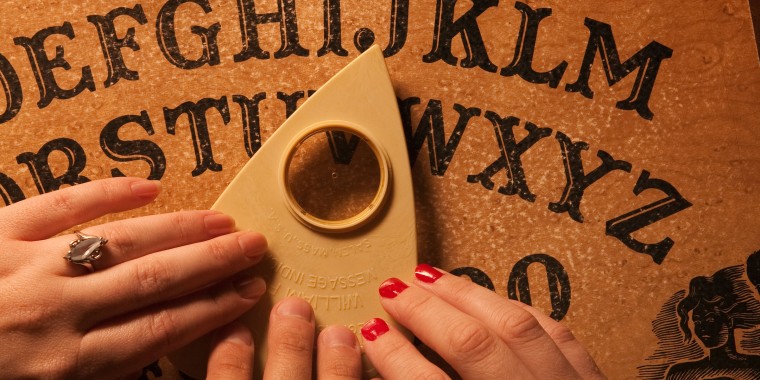For more than a century those curious about the afterlife turned to the Ouija Board for answers. To chat with ghosts a group gathers and each places an index finger onto a trivet used to spell out an otherworldly message. People report that the planchette quivers and slides across the board.
As people laugh nervously and give one another suspicious looks everyone seems to have one thought in mind: Why does it feel as if it is moving? The answer is simple.
“It is moving. And even if you just had four people putting their hands on it and trying not to move it, it is going to slide around on the board naturally,” Frank McAndrew, the Cornelia H. Dudley Professor of Psychology at Knox College in Illinois, told TODAY.
But it’s what occurs after that adds to the chills.
“When you feel that happening, you feel creeped out. Then when you see other people having the same reaction it really makes it real,” McAndrew said.
The heightened fear can make hands tremble even more causing the trivet to skitter across the board again. But the moving piece isn’t the only creepy thing about a Ouija Board. Feeling frightened as a group heightens the intensity of the experience.
“In psychology it’s known as emotional contagion. If you are in a group, especially if you are close, you start empathizing, and you start experiencing the same thing. You pick up on each other’s fear and anxiety,” Dr. Anjan Chatterjee, a neurologist and director of the Penn Center for Neuroaesthetics, told TODAY.
This convinces people that something truly sinister is at play when the planchette moves.
“You hoodwink yourself into thinking that something mystical is happening,” McAndrew said.
It allows you to almost emulate scary experiences and learn how to adapt to those and react to those emotionally.
McAndrew said the Ouija Board’s dark history also enhances its fright factor. It first started in the 1800s as a “telephone to the afterlife where you could talk to dead people.” For about 100 years, people thought of it as just that. But then in the 1900s the Catholic Church and other religious groups became concerned about it.
“They said that this was a way for demons and devils to get ahold of people,” McAndrew said. “That made it instantly more popular. It changed from a toy or possibly a way to communicate with the dead to a gateway to hell.”
Then in the 1930s and 1940s, a few murder suspects blamed the Ouija board for their misdeeds.
“People said that the Ouija board told them to kill someone,” McAndrew explained.
As the game became more sensationalized as something that causes murderous thoughts and serves as a portal to hell, the game became scarier. In the movie the "Exorcist" the Ouija board plays a prominent role as it allows the devil to possess Regan. Famous preachers started calling it the “tool of the devil.”
“It was never quite clear as to why it was and that made it more intriguing,” McAndrew said.
People flock to Ouija boards, scary movies and haunted houses as sort of a dry run for what would happen to them when faced with a demon, ghost or a blood-crazed killer in real life.
“You feel safe and to some extent that you are in control,” Chatterjee explained. “You are scared by what you are watching but at the same time you know you are safe."
This controlled experience helps people figure out how they might deal with uncertain situations in real life.
“It allows you to almost emulate scary experiences and learn how to adapt to those and react to those emotionally,” Chatterjee said.
Wanting to understand the unknown is one reason why the Ouija board remains so popular.
“Let’s face it — what happens after death is the biggest uncertainty in life. You worry about loved ones who are gone, if they are in a good place or bad,” McAndrew said. "If we could talk to someone on the other side we would feel more certain."
